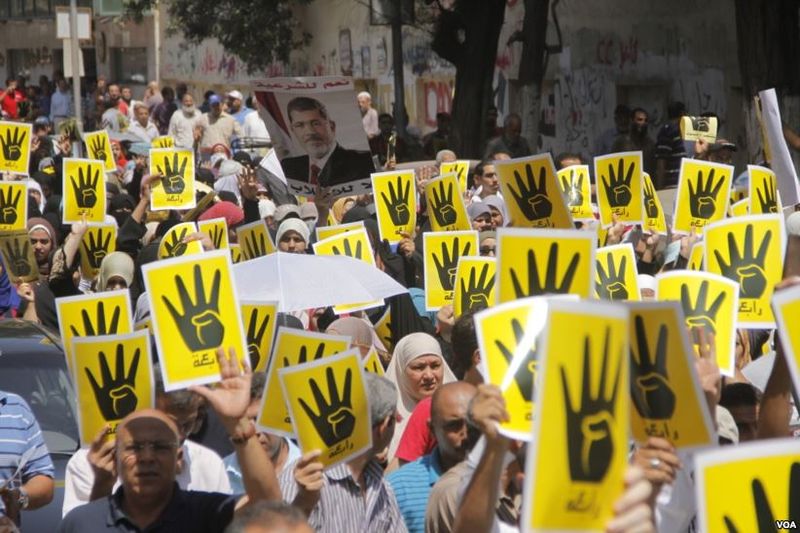Last August, Egyptian Security forces raided Rabaa Al-Adawiya Square to clear it of protesters who organized sit-ins to denounce the ousting of President Morsi by a military coup.
Armoured bulldozers were used to destroy the camps. According to Egyptian officials, more than 600 people were killed; the supporters of President Morsi speak of more than 2,000 victims. Journalists and eyewitnesses speak of a bloodbath. Human rights organizations denounced the level of brutality used by police forces; they “documented scores of deaths, and eyewitness reports from medical staff who described how many of the injured and dead had sustained bullet wounds to the upper body.”
The Egyptian population was divided, some of them siding with the new military regime while others still believed in the legitimacy of President Morsi who was democratically elected in 2011.
Canada adopted a wait-and-see approach with respect to what happened in Egypt. Diplomatically, we call it a prudent position. Even though it declared the ousting of President Morsi a coup and called all parties to remain calm, Canada didn’t warn the Egyptian military of sanctions and didn’t pull its ambassador to protest the violence used by security forces.
After the ousting of President Morsi, Foreign Affairs Minister John Baird issued a shy statement, condemning all forms of violence and calling for dialogue and peace. No trip to Rabaa Square to support the protesters. No tweets. Deafening silence!
Stephen Harper went a step further. While in Tel-Aviv receiving a doctorate for his staunch support of Israel, he praised the “return to stability” that Egypt was enjoying after the military coup. No outrage, no threats of cutting funds. The Arab Spring supporters should be “chastened,” according to him. Dreaming of a better future must be something reserved for some populations only. The security of Israel dictates Canadian politics in the region. Period.
When the Ukraine crisis emerged a few weeks ago, I couldn’t understand the degree of interest and enthusiasm the Canadian media and government showed towards the still developing situation. The wave of sympathy towards the Ukraine protesters in Maidan Square was so intense. No criticism, not doubts, no questioning of the motives or political affiliations of the protesters. Everyone in Maidan Square was angelic to the point that John Baird flew there in no time to meet them and make declarations of support.
All the protesters were labelled peaceful and the death of 77 protesters left the Western allies in disarray trying to figure out the “harshest” sanctions to impose on Russia as punishment for its handling of the Ukrainian crisis.
My point here isn’t to insinuate that the death of Egyptian protesters is worth more than that of Ukrainians activists. There is not a lot of suffering and a little suffering. Rather, it is how politicians and media twist people’s suffering to make political gains that is deplorable.
It is hypocrisy that portrays the suffering of protesters in Rabaa Square as deserved or somehow a punishment for their “terrorist affiliation,” whereas the protesters of Maidan Square are painted as a peaceful crowd denouncing the corruption and dictatorship of ousted president Viktor Yanukovych.
When lonely voices rose up and dared to question some of the fascist and anti-Semitic ideology of some of the protesters, they were quickly brushed off as mere Russian propagandists. Protesters are labelled by the media as ultra-nationalists! What an innocent appellation compared to the ones used for Rabaa Square protesters: Islamists radicals or terrorists.
Stephen Harper immediately issued a strong statement threatening Russia with punishments and recognizing the new government of Ukraine with no hesitation or dithering.
Of course the stakes here are high and one shouldn’t be mesmerized by ideals of equality. Ukraine is strategically important for Europe and for the West. Any prospect to give away Ukraine to Putin’s Russia as an economic “gift” is out of the question. The same political and security stakes played out in Egypt but not in favour of the protesters — they served instead to preserve the security of Israel and of Western allies and Arab monarchies in the region. That, my friends, is called hypocrisy… there is no other “politically correct” way to put it, unfortunately.
Monia Mazigh was born and raised in Tunisia and immigrated to Canada in 1991. Mazigh was catapulted onto the public stage in 2002 when her husband, Maher Arar, was deported to Syria where he was tortured and held without charge for over a year. She campaigned tirelessly for his release. Mazigh holds a PhD in finance from McGill University. In 2008, she published a memoir, Hope and Despair, about her pursuit of justice, and in 2011, a novel in French, Miroirs et mirages.
Photo: H. Elrasam for VOA/Wikimedia Commons



